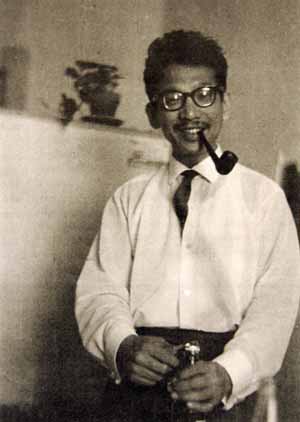‘Tell the World the Truth’
Minn Latt Yekhaun was one of the first three Burmese students to study in Prague during the 1950s. Despite his tragic death more than 20 years ago, his influence on Burmese-Czech relations remains to this day
In 1966, Burmese intellectual Minn Latt Yekhaun was sitting in Tatran, his favorite Wenceslav Square cafe in Prague, Czechoslovakia, when a convoy passed by escorting Gen Ne Win, the authoritarian ruler of Burma who had taken power four years earlier in a military coup. Minn Latt immediately left the cafe and contacted his friend and colleague, Dr. Dagmar Bečková, and made a dangerous request.
 |
| Minn Latt Yekhaun photographed in Czechoslavakia. (Photo: Burma Center Prague/Dagmar Bečková) |
Minn Latt knew he was taking a big risk by confronting Ne Win—Burmese studying overseas who became political were normally required to return home, and the junta would certainly not have given Minn Latt a warm welcome back in Burma. Minn Latt could not have known at the time, however, that while his propensity to boldly speak truth to power would ultimately lead to his tragic death, it would not come at the hands of Ne Win, but from guns fired by his own Communist comrades in the jungles of northern Burma.
Minn Latt was a Burmese linguist, historian and writer who studied at the prestigious St. Paul’s Grammar School in Rangoon. Born in 1925, he joined the Burmese resistance against the Japanese during World War II in the Pegu region of Lower Burma. After the war, he became a member of the White Flag faction of the Communist Party of Burma (CPB) and went underground in 1948, shortly after Burma regained its independence from Britain.
When Minn Latt arrived in Prague in 1950, he was one of the first three Burmese students ever to come to the Czech capital. He studied English and history at the Faculty of Philology of Charles University, and his “Burma in English Letters” became an introduction to Burmese studies in Prague.
In 1955, Minn Latt began teaching Burmese at the Prague Language School. He also published “The Prague Method Burmese Reader with Burmese-English and English-Burmese Alphabetical Vocabularies,” which gave Czech students their first chance to study the modern Burmese language. In addition, Minn Latt became a researcher at the Oriental Institute of the Czechoslovak Academy of Science in Prague and a lecturer at the Faculty of Philosophy at Charles University, positions he held until he left Prague in 1967.
Minn Latt’s contribution to Czech-Burmese relations is significant. “His book ‘Burma – the Crossroads of Asia,’ published in Prague in 1958, was the first introduction to the history, politics and economics of Burma for the Czech public,” Bečková wrote in Focus on Burma, a 2008 publication by Burma Center Prague, a non-profit NGO run by Burmese living in the Czech Republic and supporters of Burma.
Minn Latt’s greatest research milestone, according to Bečková, was his book “Modernization of Burmese,” in which he performed a deep analysis of the Burmese language and its modern usage and offered his own proposal for further development of the language. Not only was “Modernization of Burmese” significant in terms of its academic impact, the book also demonstrated once again Minn Latt’s willingness to openly challenge those in power, this time in the form of the academic establishment who resisted the use of anything other than classical Burmese.
In addition to being an academic and activist, Minn Latt was also an active writer whose short stories and poems were published in Burma under the name Yekhaun. And during the period that Minn Latt was in Prague, a young Czech by the name of Václav Havel was also making a name for himself by writing plays that spoke truth to authoritarian power. The two contemporary author activists shared the ability to stand up and risk their lives in opposition to government oppression. Havel went on to lead the 1989 Velvet Revolution—when Communism fell peacefully in Czechoslovakia—and became the country’s first president.
1 | 2 | 3 next page »
|
||
|
||
|
||
|
||
|
||
|
||
